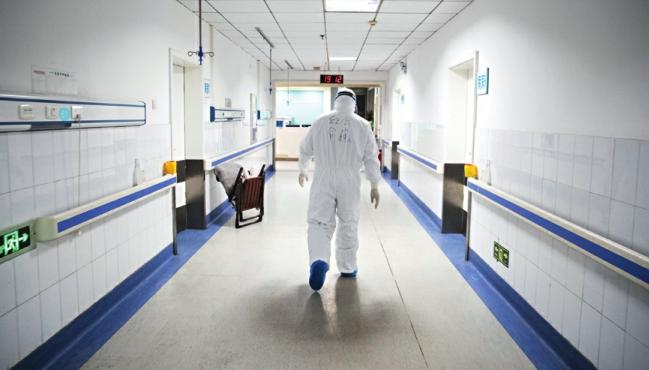Epidemiological Investigators on the Frontline
2020-03-23ByHUMAN&ZENGLI
By HU MAN & ZENG LI
IF the medical workers are the frontline “soldiers,” then the epidemic investigation and disposal personnel are the “scouts” on the frontline. They are responsible for the epidemiological investigation of infected patients, standing at the very forefront of the battle for prevention and control of the novel coronavirus.
“Maybe there is a risk of infection afflicting us, maybe no one will remember what we have done in the future, but it is our duty to prevent the spread of the epidemic and protect the publics health,” said Guan Xuhua, director of the Institute of Prevention and Control of Infectious Diseases under Hubei Provincial Center for Disease Control and Prevention. As the epidemic came so unexpectedly and the task so pressing, Guan revealed that their on-site epidemiology investigators did not even have a chance to take a picture while carrying out their work at the isolation area in the beginning.
To Better Understand the Virus
At 7:00 p.m. on December 29, 2019, Wuhan Jinyintan Hospital issued an emergency notice: a number of patients with pneumonia of unknown causes received by the hospital were related to the Huanan Seafood Wholesale Market, and it was requested that the Center for Disease Control and Prevention send personnel to carry out epidemiological investigation.
Upon receiving the task, Chen Qi, an epidemiology investigator who had worked for eight years in the field, felt a “conditioned reflex.” She knew that it was a race against the virus, and they had to uncover its true face before the virus became rampant. Only by understanding the information of each patient in detail and finding out the similarities and differences, can the basis be provided for decision-making for the planning of the next phase of prevention and control measures and the formulation of the diagnosis and treatment plan.
Epidemiological investigation needs to sift through clues from the massive amount of information provided by patients and eliminate the confounding factors. Chen Qi said she was more like Sherlock Holmes. The enemy was an “invisible devil” that could not be spotted by the naked eye or felt by touch. Therefore, no details could be ignored.
Risks abound naturally in this line of work. When she entered the isolation zone step by step, her heart tightened as she did not know how obstinate the unknown virus was, and whether her own protection was adequate enough to deal with the invisible “enemy.”
In fact, the details of this occupation puzzle many people. Can it not be done by phone? Why venture into the quarantine area again and again? Liu Gongping, Chen Qis colleague, who has been working in the epidemiology investigation field for 41 years, said that when encountering an epidemic, we cannot afford to miss a single detail. Only by having a deeper understanding of the situation and conducting painstaking investigation, can the true nature of the virus be exposed.
Liu is the deputy director of the Institute of Prevention and Control of Infectious Diseases under Hubei Provincial Center for Disease Control and Prevention. For over a month, he, like other epidemiology investigators, has been working on the frontline of the investigation.
“Although we take many risks, we can reduce the risk of proliferation; if we know more about it, we can save more lives from the virus,” Liu said.
For Accuracy, to “Interrogate” Every Detail
Asking different patients the same questions over and over again, and cross-checking every detail over and over again; boredom and dullness are an inevitability of this profession, but they dare not relax at all, because the closer they get to the details, the closer they will get to the truth.
Every day, Guan Xuhua leads the team in visiting several hospitals. After putting on two layers of gloves and masks, protective clothing, face shields, and shoe covers, the eyes behind the protective goggles are the only “name cards” for them to identify each other.
After putting on such a protective outfit, Guan Xuhua enters the semi-polluted area alone, goes through the sealed gate, and then enters the isolation area.
“Happy Spring Festival! I am a staff member of Hubei Provincial Center for Disease Control and Prevention. Are you feeling better now? You have been diagnosed with the novel coronavirus-caused pneumonia and now we need to learn more about your situation. Thank you for your cooperation,” She repeats such opening remarks countless times a day.
Details from the patients daily itinerary, the places they have been to, the people they have had physical contact with, to the clinical details and the past medical history are all the key points she captures and records on the questionnaire one by one.“While a longer stay means increasing risk, we must ensure that the information is accurate and complete,” she said.
In order to avoid risks, Guan Xuhua cannot take paper, pens, or other items out of an isolation area. Consequently her colleague Liu Man takes pictures of all the questionnaire pages with his mobile phone from across the glass. Then they take off their protec- tive gear but have no time to rest before they continue going on to the next site and the next battlefield...
Do they feel afraid when going deep into the isolation area to meet with the confirmed coronavirus patients? The investigators all admitted that since they are also someones child, parent, husband or wife, and ordinary people, “Of course, we also feel afraid, but when the task comes, we will go for it anyway without hesitation.”
Helping Patients Defeat the“Psychological Virus”
Talking to the patient is not an easy task. Facing unfamiliar investigators, resistance and repulsion are the instinctive reactions of many patients.
“Some patients have a hazy memory or even deliberately conceal details, which makes the work more difficult. In addition to patience, we also need to be gentle in our use of language and empathy must be visible from our eyes,” said Wu Yang, head of the acute infectious disease prevention and control department of the institute. In reality, the isolated patients are panic-stricken and helpless. According to him, what they need to defeat is not only the novel coronavirus, but also the “psychological virus.”
A female patient in the isolation ward told Wu Yang about her experience. Their whole families got infected and quarantined for taking care of her sick father. The difficulty of confronting the uncertain future filled her with fear. With tears in her eyes, she said, “Im hospitalized now. I just hope to get better soon and go home early!”
“At that moment, her words touched me, and I felt that my duty was not only to investigate, but also to provide psychological counseling,” Wu said. According to him, many investigators have equipped themselves with psychological counseling knowledge by reading professional books, hoping to help patients get passed the psychological shadows of the virus.
For about 20 days, they have conducted hundreds of case studies. To get a better understanding of the epidemic and provide strong empirical evidence and supporting data, the investigation team is still on the go.
